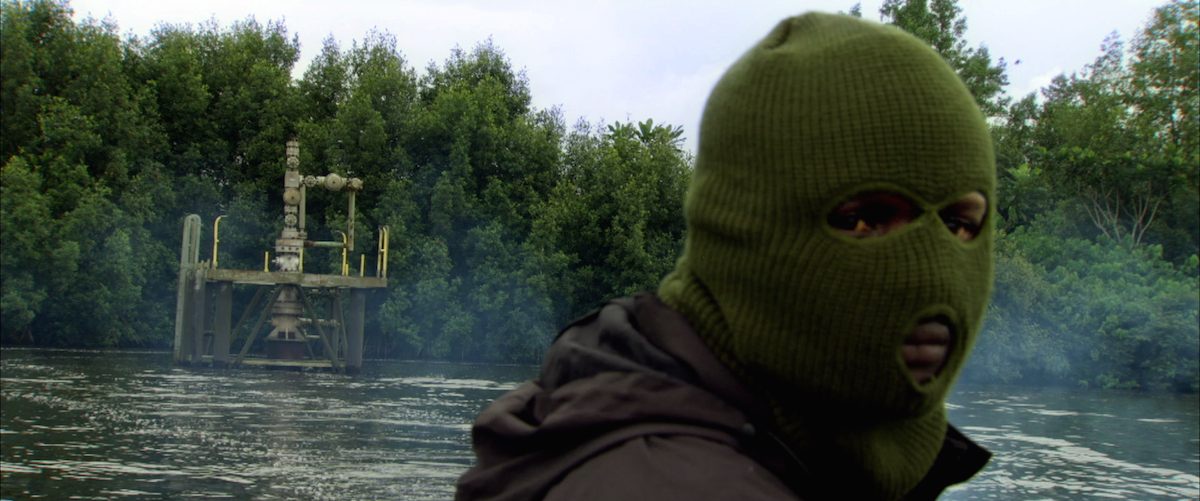If you want to see the ugly side of capitalism, one place you are sure to get a glimpse is anywhere established First World economies interact with Third World economies. That’s where the drive for profit above all else is unhindered by a fully developed system of laws and regulations. In “Big Men”, Rachel Boynton offers a case study in how the promise of big wealth brings out the ruthless self-interest of all the parties concerned. Along the way, she raises larger questions that lift this doc above being a simple lecture on how greed is bad and big oil is evil, making it into something with more heft.
The doc follows the key players in the massive Jubilee oil field discovered off the coast of Ghana. Jim Musselman, the president of Kosmos Energy, is a strapping Texan with ranching in his blood who turned to oil exploration. As the doc begins, in 2007, his company has made the discovery of a lifetime. The Jubilee field promises to make someone very, very rich. The question is who will reap the benefits. Will it be Musselman and his tiny company, which takes high risks in oil exploration in hopes of a big return like Jubilee? Will it be George Owusu, the local agent hired to promote Kosmos’ interests in Ghana? Will it be the government of Ghana? Will it be the already rich and powerful of Ghana, skimming off the profits for themselves? Or will Ghana, seeing the example of how oil has ruined nearby Nigeria, follow a more enlightened path and find ways to raise the quality of life of the poor of Ghana? And what will happen when the oil boom, in high gear in 2007, hits the economic meltdown?
As the film began, I will admit I thought I knew pretty much where Boynton was heading: Big oil bad, corrupt government bad, profit-sharing with the poor good but unlikely. And that’s certainly the general trajectory here. The rich find new and novel ways to screw over the poor, but also each other. It’s rather dazzling when the Kosmos Board of Directors lose faith in Musselman and fire him, and he gets a bit more blunt and honest on camera about how everyone involved is ready to throw anyone under the bus to increase their share. Of course, the delicious irony is that Musselman is saying all this just minutes after we’ve seen him throw George Owusu, the Ghanian agent, under the bus in an international investigation of corrupt business practices.
And frankly, Boynton’s inclusion of substantial footage of Nigeria feels like a move necessary to the civics lesson rather than a natural outgrowth of the story she is telling. Yes, Nigeria offers a cautionary tale about how badly managed oil development and a corrupt government can lead to increased poverty and a social and ecological disaster. But it also feels a bit forced, as if Boynton is setting the poor desperate rebels of Nigeria into a didactic opposition to the Big Oil players she has been following.
The surprise of the film is twofold. First, Boynton doesn’t make anyone into a cartoon villain. There are a few unsubtle moments, like showing a close-up of a Ghanian government official’s gold-ring-bedecked hands while asking him about corruption. But on the whole, she allows Musselman, Owusu and others to emerge as real, complicated people. Musselman can wax philosophical about being kicked out of his own company and see exactly the moves on the international chess board that made him the inevitable fall guy for the investors, and muse on the new Ghanian administration that wants a bigger piece of the pie: “They’re just as corrupt as can be.” That’s pretty thick irony considering the people Musselman’s company has been doing business with in the previous administration. (Of course, he can be so calm about it in part because he still owns Kosmos stock that makes him rich regardless of his job title…).
The second and more interesting twist is how Boynton raises the bigger questions. In interview after interview, we hear people ponder how self interest relates to the greater good. Is brutal self interest at the expense of others an inherent part of human nature? Is there a way to harness self interest for the greater good? What makes people act against their own self interest? As the documentary closes, the rich have gotten richer and the fate of the poor of Ghana remains an unanswered question. But it’s those bigger questions about our nature and our capacity to think beyond self interest that will stick with you.



















